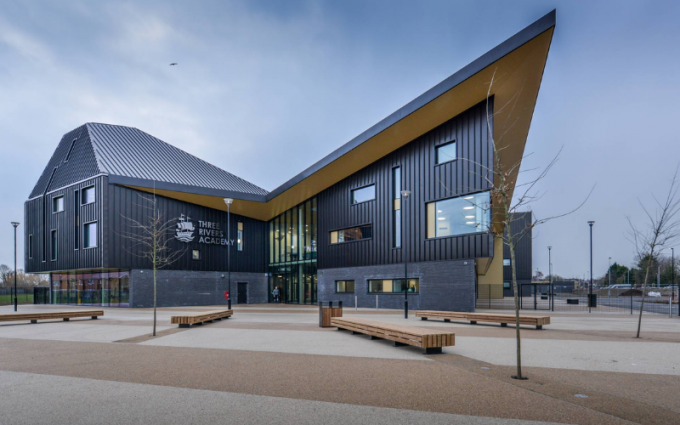All Saints Church of England School is a primary setting in Leicestershire. Eager to take a different approach to managing behaviour, the team decided to focus on creating a safe, calm school environment for their pupils.
Read on to hear from Assistant Headteacher, Tunde Read, as he shares the impact of putting wellbeing at the heart of school life, how Thrive has helped to reduce exclusions, and what it’s like to win the NAPCE Pastoral Team of the Year award.
Written by Tunde Read, Assistant Headteacher at All Saints Church of England School.
Taking a different approach to managing behaviour
All Saints C of E Primary School has 252 pupils with a higher-than-average number of pupils with Special Educational Needs and a higher-than-average number of pupils in receipt of free school meals. We believe passionately that everyone in our setting has a part to play in supporting our children.
Three years ago, we made a conscious decision to take a different approach when it comes to managing behaviour. We decided to focus on creating a safe and calm school environment so that our pupils can learn to recognise and regulate their emotions because we believe this is the foundation for managing behaviour, attainment and attendance.
When we see a child who is experiencing emotional, social or behavioural difficulties, we seek to support and understand them. We know that many children are unable to regulate strong emotions and we believe that by understanding what is going on for that child, whether at school or at home, we can help them far more than by punishing them. Of course, this doesn't mean that we accept anti-social or destructive behaviour, but we recognise that behaviour is a communication of unmet need and we want to find out what this need is and to ensure that it is met so that our children are calm, regulated and ready to learn.
Putting wellbeing at the heart of school life
To help us realise this vision of a safe and calm environment, we have used the Thrive Approach, which helps adults to understand and respond appropriately to children's behaviour. This has given us the tools and support that we needed to put wellbeing at the heart of school life. We have embedded a focus on mental health throughout the day and we have sought to take it out to the wider school community by including families in our efforts. We have done this because we believe that if there is continuity between school and home then this will bring about the best results. Our families know that the school is at the end of a phone and we have supported them through things like health worries or difficulties at home.
We have a nurture provision so that if children are struggling in class they have somewhere quiet to go and learn away from the classroom. Our classes can have up to 30 children which can be a really difficult environment for some pupils. We give them the choice of whether they want to go there because we are clear that it's not a punishment. Instead, it's a space for them to have a break from the noise and activity of class until they feel ready to go back. We have a similar quiet, safe space available for break and lunch times known as The Ark. When children go there, they will take part in activities aimed at developing and building confidence in their social skills. We find that when children are in a quieter environment with a small number of peers, they feel safer and are better able to engage with each other and learn social skills so that they feel confident enough to return to the playground.
Introducing a whole school breakfast
Another measure we have found particularly effective has been to have a whole school breakfast where every child has access to something to eat in the mornings. It's a small thing, but it gives staff the opportunity to debrief afterwards and we get a lot of our safeguarding information from this. Children will tell staff if they haven't had a lot of sleep or if something is going on at home. It's also social time where we can all come together and feel comfortable and safe. It's something we know helps our families. Certainly in my house, the mornings are a time when everyone is busy and often in a rush. If families have two or three children it can be a battle to get everyone fed and clothed and out of the door on time. We felt the breakfast would be a way of providing practical help with this, as well as creating additional social time for teachers and pupils to spend together.
No fixed term exclusions in 18 months
The most striking impact of these changes has been on fixed term exclusions. In 2017/8 we had a fixed term exclusion rate of 3.7 per cent, with 1.9 per cent of these repeated. Over the last 18 months, we have had no fixed term exclusions, a result we are really pleased with.
Of course, we've had the disruption of Covid over the same time, but we've been out of lockdown for a little while now and we had a number of vulnerable children in school throughout the pandemic. I think this is really important because exclusions create massive issues for the children and we are very clear that we are here to support them.
We've made progress with attainment levels and this is something that we will continue to look at. Punctuality has improved and so has attendance, although we know we have more work to do in this area. It's tricky at the moment, because of Covid, to focus on this. We want to get our approach to it right - we don't want to adopt a reward system for good attendance because we know it's not the children's fault if they are ill and it's often not their fault if they're late. We want to continue with our approach of supporting them and their families and seeking to understand the reasons behind any problems they are having.
NAPCE Pastoral Team of the Year
On the night the NAPCE awards were held, because it was an online ceremony and we weren't expecting to win, I had just finished a workout and I was still wearing my T-shirt when they called our name out. Ben, another team member, does amateur dramatics and he was about to go on stage when we heard that we had won. Our staff WhatsApp group was pinging and everyone was absolutely buzzing with the news. It's really nice to win an award and to be recognised in that way but that's not why we do what we do. We do it to help our children and to make sure that they are resilient and ready to learn.
We're three years into our journey now and although it's been a struggle at times to change minds and ideologies, we have achieved so much that I know we will continue on this path and that we will continue to see our outcomes improve. We love Thrive. It has helped us to take our understanding of children's emotions and behaviour to the next level. It has given us the tools and support that they need and I would recommend it to every school.
Over to you
Reduced anxiety and behavioural incidents. Calmer classrooms filled with engaged leaners. Improved relationships with parents and carers. These are just some of the outcomes reported by settings embedding Thrive’s whole-school approach to mental health and wellbeing. Are you ready to join them? Click here to get started.
Pass it on
Small actions can lead to a big ripple effect. If you enjoyed this post or found it helpful, please consider supporting us in our mission to help every child and young person feel safe, supported and ready to learn by sharing it using the social media buttons below.
Want to join a like-minded community of senior leaders and classroom staff benefitting from insights and strategies to improve attendance, behaviour and attainment? Add your email address below. (It’s easy to unsubscribe).

_680.jpg)
_680.png)
_680.jpg)

